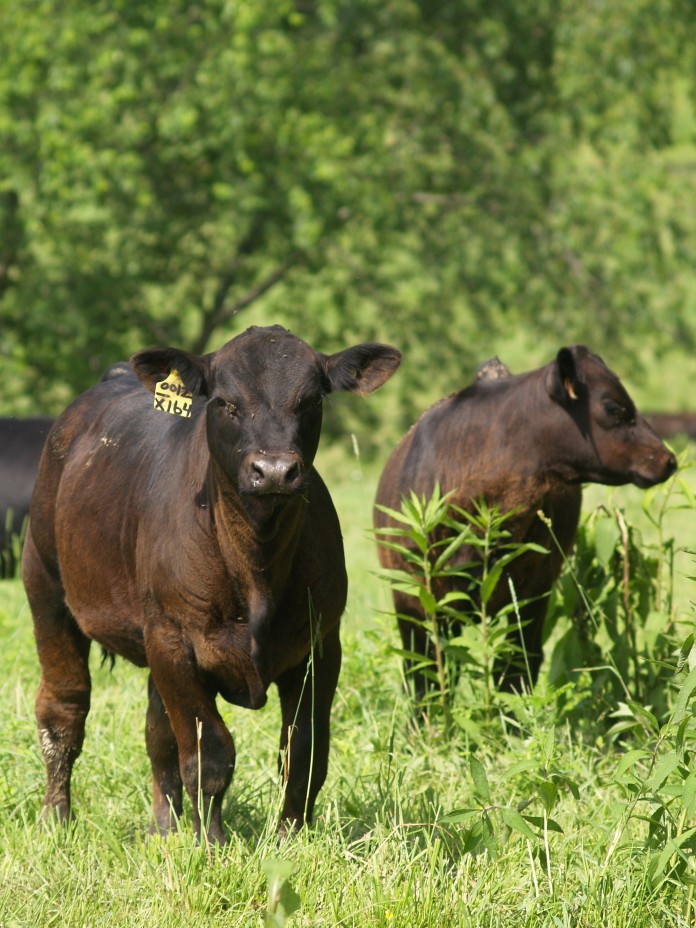SALEM, Ohio — A Cornell University study by a veterinarian and a professor of molecular medicine suggests a link may exist between fracking and illness in food animals.
However, those on the other side say the study is flawed.
Twenty-four cases
The researchers, veterinarian Michelle Bamberger and Robert Oswald, published the study of 24 cases of farmers in six shale states, including Ohio and Pennsylvania. They concluded the livestock experienced neurological, reproductive and gastrointestinal problems after being exposed to fracking fluids either accidentally or incidentally.
The article was originally published in New Solutions: A Journal of Environmental and Occupational Health Policy.
Study
According to the study, more than one-third of the cases involved conventional wells and the remainder were horizontal wells.
The most dramatic case, the study noted, was the death of 17 cattle in one hour after being exposed directly to hydraulic fracturing fluid.
In north central Pennsylvania, 140 cattle were exposed to fracking wastewater after an impoundment was breached. Seventy of the cattle died and the remainder produced only 11 calves in which only three survived.
Weight loss and stillbirths
The researchers also noted loss of weight in many of the cattle at the farms they studied. There were also deaths reported as the result of different poisonings after different animals were able to get into fracking fluids accidentally.
The symptoms included neurological symptoms and weight loss in horses, problems with dairy goats reproducing, and abnormalities in companion animals such as dogs.
Some farms self-reported adult animals suffering miscarriages or stillborn births and reported the animals had been accidentally exposed to fracking fluid.
There was limited research on the impact on dairy farms in the study.
Authors conclusions
The authors concede the study is imperfect and lacks control in the experiment. The authors also commented that because of the confidentiality agreements signed, the information available from the impacted farms was limited.
On the other side. Meanwhile, energy trade groups are rebutting the study.
Energy in Depth, a research group, commented that the report conceals names and locations, which means independent review of the claims and parties involved cannot be completed. It also points out that statements from the researchers about their findings are asserted as fact.
“With so much potential for Ohio in the continued development of our state’s oil and natural gas resources, it is imperative we have an open, fact-based conversation based on scientific evidence rather than hyperbole and predetermined assumptions,” said Dan Alfaro, spokesman for Energy in Depth. “This study fails to meet that standard.”
No scientific merit
He said the assumptions made in the study are not based on any scientific merit, instead, they use unverifiable, anecdotal information to fit a predetermined narrative, one that is in conflict with a number of studies on the same issue — including four recent studies from Texas and neighboring Pennsylvania.
“The authors themselves acknowledge the paper is not a study of the health impacts of specific chemical exposures related to gas drilling, and is, in fact, an imperfect study,” said Alfaro.
Download the Cornell University study.
Read more Utica Shale news.











OK, so where are the links to the four recent studies conflicting from Texas and neighboring Pennsylvania??
Hi,
You can view the whole study as a PDF if you’d like.
We’ve made it available at the bottom of the article above.
Thanks!
Will
Thanks Will. However, I was referring to the four studies referred to in the following paragraph:
“He said the assumptions made in the study are not based on any scientific merit, instead, they use unverifiable, anecdotal information to fit a predetermined narrative, one that is in conflict with a number of studies on the same issue — including four recent studies from Texas and neighboring Pennsylvania.”
Are links to the “four recent studies from Texas and neighboring Pennsylvania” available?? Are you saying that links to these are included in the “whole study”??
Thanks Will. However, I was referring to the four studies referred to in the following paragraph:
“He said the assumptions made in the study are not based on any scientific merit, instead, they use unverifiable, anecdotal information to fit a predetermined narrative, one that is in conflict with a number of studies on the same issue — including four recent studies from Texas and neighboring Pennsylvania.”
Are links to the “*four recent studies from Texas and neighboring Pennsylvania” available?? Are you saying that links to these are included in the “whole study”??
No scientific merit indeed…. I did read the pdf article.
I’m trying to objectively look at this, however I STILL don’t see anyone providing links to the “four recent studies from Texas and neighboring Pennsylvania”. Do they even exist? Please cite references!
Without doing that, it begins to look like someone is making up stories and lacks legitimacy.
Thanks,
G.S.
Since the companies that are doing the drilling don’t care you need to see if they are backed by the H$U$. They want all animals dead and this seems like a good way to kill them.
It has been reported that monies funding the work on fracking by Cornell comes from a left wing liberal environmentalist.
Be wary of information on oil fracking published by Cornell University.
Just more lies to try and shut down drilling.just like Obama signing a bill to protect the prairie Chicken,,so no one can drill where it lives,,well did he forget that the wind turbines also disrupt it’s habitate,,and the new movie promise land is full of lies about fracing.
Wow, you must work for gas and oil companies. No one said anything about shutting down drilling. However, I raise beef cattle and if my cattle got into the fracing waste fluids, would you like me to send you the beef so you can eat it? I am sure not going to take that risk with the beef my family eats.